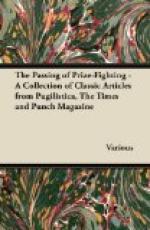Brief interval for lunch, and then a drizzle
Fell on the dreary field.
Like some dead moth
The thing remained. Chagrin commenced
to sizzle,
And certain people cried,
“A thillingth loth.”
Others, “Hey, Mister Airman, it’s
a swizzle!”
Then a stern man came out,
and with a cloth
Lightly, as one
well used to such a feat,
Swaddled the brute’s
propeller and its seat.
The skies grew darkling, and there went
a rumour,
“The thing is off; he
will not fly to-day;”
And forth we wandered, some in rare ill-humour,
But not, oh, not the bard.
Yet this I say—
There are two kinds of courage: one’s
a boomer
Avid of gold and glory; this
is A,
Crowned with a
palm, and in her hands I see
Sheaves of press
cuttings. There is also B.
Not venturesome, this last, to brave the
billows,
To beard the panther in his
hidden lair,
To probe the epiderms of armadillos,
Nor execute wild cart-wheels
in the air;
But who shall say how much Britannia still
owes
To B, the kind of courage
that can bear
Dauntless to wait,
whate’er the skies portend,
(Having paid entrance)
to the bitter end?
The heavenly hero in his suit of leather
Soars through Olympus with
the world beneath
Sometimes, and sometimes, owing to the
weather,
Scratches his fixtures in
the tempest’s teeth.
Shall the high gods, who gaze on both
together,
Count him the nobler, or confer
their wreath
On the brave bull-dog
bard, who risks his thews
Standing about
all day in thin-soled shoes?
EVOE.
* * * * *
[Illustration: “HERE’S ONE I’M SURE YOU’LL LIKE, TREVOR.”
“WHAT IS IT?”
“ROBINSON CRUSOE.”
“IN WHAT LANGUAGE?”]
* * * * *
OUR BOOKING-OFFICE.
(BY MR. PUNCH’S STAFF OF LEARNED CLERKS.)
Just as one may say of certain novelists that they write at the top of their voices, so, I think, one might describe Miss VIOLA MEYNELL as writing in a whisper. This certainly is the effect that Modern Lovers (SECKER) produced upon me. The gentle method of it invested the story—which of itself is a very slight thing—with an odd significance almost impossible to communicate in criticism; but the reading of a few pages will show you what I mean. The title is apt enough, for the tale is about nothing but love, as it affects a group of five young people, three men and two girls. Of the girls, who are sisters, Effie Rutherglen is the more important and detailed figure. Effie, in the time before the story opens, had an affair with Oliver Bligh; then, summoned North to live with her futile and uncomprehending parents, she fell (as did her sister Milly and most of the local




